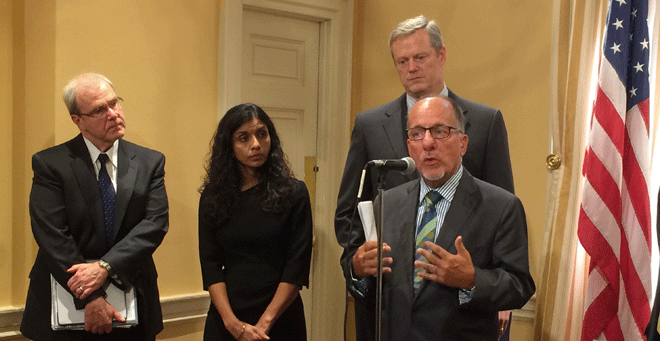 |
|
|
(L-R) Terence Flotte, MD, Monica Bharel, MD, MPH, and Gov. Baker listen as Dennis Dimitri, MD, speaks at a press conference on opioid prescribing practices and training. |
The Massachusetts Medical Education Working Group, a first-in-the-nation collaboration between state medical schools and health officials convened to develop cross-institutional core competences for the prevention and management of prescription drug misuse, has published a paper about the state-of-the-art core competencies it developed in Academic Medicine, the journal of the Association of American Medical Colleges.
The group was convened by Gov. Charlie Baker and Marylou Sudders, secretary for the Massachusetts Department of Health and Human Services.
The paper, “Developing Core Competencies for the Prevention and Management of Prescription Drug Misuse: A Medical Education Collaboration in Massachusetts,” highlights the UMMS Opioid Safe Prescribing and Training Immersion performance assessment for incorporating patient- and standardized patient-based examinations, as well as technology-enhanced simulations.
The group comprised deans of the four Massachusetts medical schools, including Terence R. Flotte, MD, the Celia and Isaac Haidak Professor of Medical Education, executive deputy chancellor, provost and dean of the UMMS School of Medicine; leaders from the Massachusetts Department of Health and the Massachusetts Medical Society, including Dennis M. Dimitri, MD, vice chair and clinical associate professor of family medicine & community health at UMMS and MMS past president; and senior faculty. During a two-month period, the group defined 10 core competencies for the prevention and management of prescription drug misuse that all graduating medical students must demonstrate.
UMass Medical School was quick to implement the strategy for both medical and nursing students and was the first medical school in the commonwealth to fully incorporate the competences into its curriculum, with a focus on preventing prescription drug misuse, treating patients at risk for substance abuse and managing substance-use disorders as chronic diseases.
“I think we’re the national model here at UMass, both in the type of education we’re doing for opioid safe prescribing, and in the fact that we’re doing this collaboratively among the four medical schools. We’re responding to a crisis in our community,” Dean Flotte said.
“We have a series of high fidelity simulations and we have patient actors who will work through live scenarios where the students have to evaluate and treat their pain, identify patients at risk, manage patients with overdose, manage patients with substance abuse disorders,” Flotte said.
The program has met with so much success that Gov. Baker announced this week that the core competencies were recently adopted by the state’s advanced practice nursing programs and professional organizations, physician assistant programs, the Massachusetts Association of Physician Assistants, the Massachusetts League of Community Health Centers, and all affiliated community health centers. In total, 8,200 students and clinical professionals throughout the state are being trained using the standards established by the Medical Education Working Group.
In addition, public health officials and government leadership in New York, Pennsylvania and Illinois have expressed an interest in replicating the program after hearing Baker present the core competencies during the National Governors Association’s summer meeting.
“Agreeing upon and expanding these core competency standards is another major step for the prevention and management phases of fighting the opioid epidemic,” said Baker. “As we search for new ways to bend the trend in this public health epidemic, we appreciate the hard work and collaboration that prescriber and academic communities have demonstrated and look forward to continuing this partnership with our nurses, physician assistants and members of the medical community.”
Related stories on UMassMedNow:
Gov. Baker lauds UMass Medical School graduates at 43rd Commencement
UMMS implements curriculum changes in current academic year to address opioid crisis
UMMS working with other Mass. medical schools, governor on opioid prescribing practices
UMMS Graduate School of Nursing adopts opioid conscious curriculum